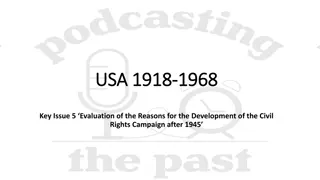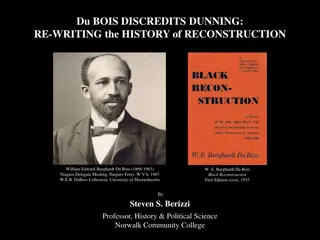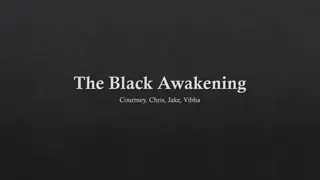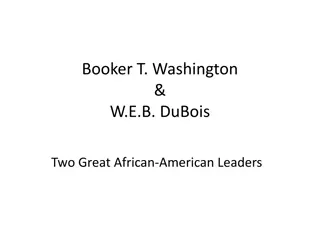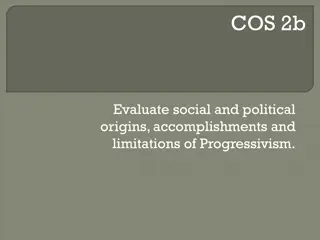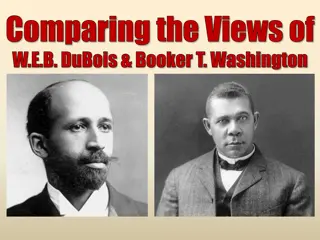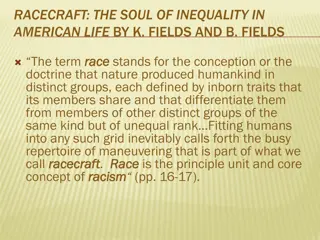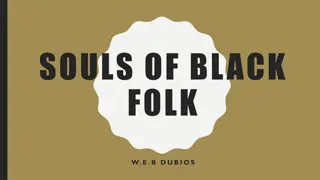Factors Influencing the Civil Rights Campaign in the USA After 1945
The civil rights campaign in the USA after 1945 was influenced by factors such as the continuation of prejudice and discrimination, the experiences of Black servicemen in WW2, the role of Black civil rights organizations, the leadership of Martin Luther King, and the emergence of effective Black lea
0 views • 39 slides
Discrediting Dunning: The Untold Story of Reconstruction by W.E.B. Du Bois
Reconstruction after the Civil War marked a pivotal period in U.S. history, with the promise of progress towards multiracial democracy curtailed by resistance and the rise of the Jim Crow Era. William Archibald Dunning's influential narrative upholding segregation was challenged by W.E.B. Du Bois, s
0 views • 20 slides
The Black Awakening: Challenges and Triumphs in African American Civil Rights Movement
In the early 20th century, influential leaders like Booker T. Washington and W.E.B. Du Bois led the fight for political and civil equality for African Americans. Despite facing obstacles such as segregation and disenfranchisement, groups like the Niagara Movement and NAACP emerged to promote racial
0 views • 7 slides
African-American Leadership: Booker T. Washington vs. W.E.B. Du Bois Debate
Booker T. Washington and W.E.B. Du Bois were two influential African-American leaders with differing views on strategies for black social and economic progress in the United States. Washington believed in self-help, racial solidarity, and accommodation, focusing on education in crafts and industrial
0 views • 5 slides
Challenges and Progress in 1920s American Civil Rights Movement
The 1920s in America saw significant changes in civil rights, women's movement, and prohibition. Civil rights encompass personal freedoms guaranteed by the U.S. Constitution, including freedom of speech, voting rights, and protection from discrimination. Violations of civil rights have occurred thro
1 views • 42 slides
African American Civil Rights Leaders and Progressivism
African American leaders such as W.E.B. Du Bois and others played crucial roles in the fight for civil rights, challenging racial segregation and discrimination. The establishment of organizations like the NAACP and movements like the Niagara Movement showcased the social and political origins of Pr
2 views • 13 slides
Contrasting Philosophies of W.E.B. Du Bois and Booker T. Washington
Explore the differing viewpoints of W.E.B. Du Bois and Booker T. Washington towards African American rights and progression post-Civil War. While Washington advocated for gradual equality through vocational training, Du Bois championed immediate equality and education for the talented 10th of Africa
0 views • 12 slides
Booker T. Washington vs. W.E.B. Du Bois: A Comparison in African American Rights Advocacy
Booker T. Washington and W.E.B. Du Bois were prominent figures in the African American rights movement, each advocating for equality through different approaches. Washington focused on vocational training and economic opportunities through his Tuskegee Institute, while Du Bois emphasized education a
0 views • 6 slides
Racecraft: The Soul of Inequality in American Life Review
Racecraft explores the concept of race and racism, delving into the inherent inequalities in American society. It discusses the historical significance of works like "The Souls of Black Folk" by W.E.B. Du Bois and the complexities of the color line in the 20th century. The book highlights the multid
0 views • 31 slides
Analysis of Du Bois' Use of Prejudice and Rhetorical Devices in 'Souls of Black Folk'
In W.E.B. Du Bois' "Souls of Black Folk," he explores the concept of prejudice and its impact on the African American community. Du Bois contrasts white Americans' perspective on prejudice as a defense of culture with the reality of how it humiliates and undermines African Americans. Through powerfu
0 views • 9 slides
Gilded Age Test Review
Transcontinental Railroad construction with land grants, government regulation due to unfair business practices, urbanization impact on rich-poor gap, Thomas Nast's political illustrations, nativist stance on immigration restrictions, post-Reconstruction era corruption, Plessy v. Ferguson segregatio
0 views • 14 slides
